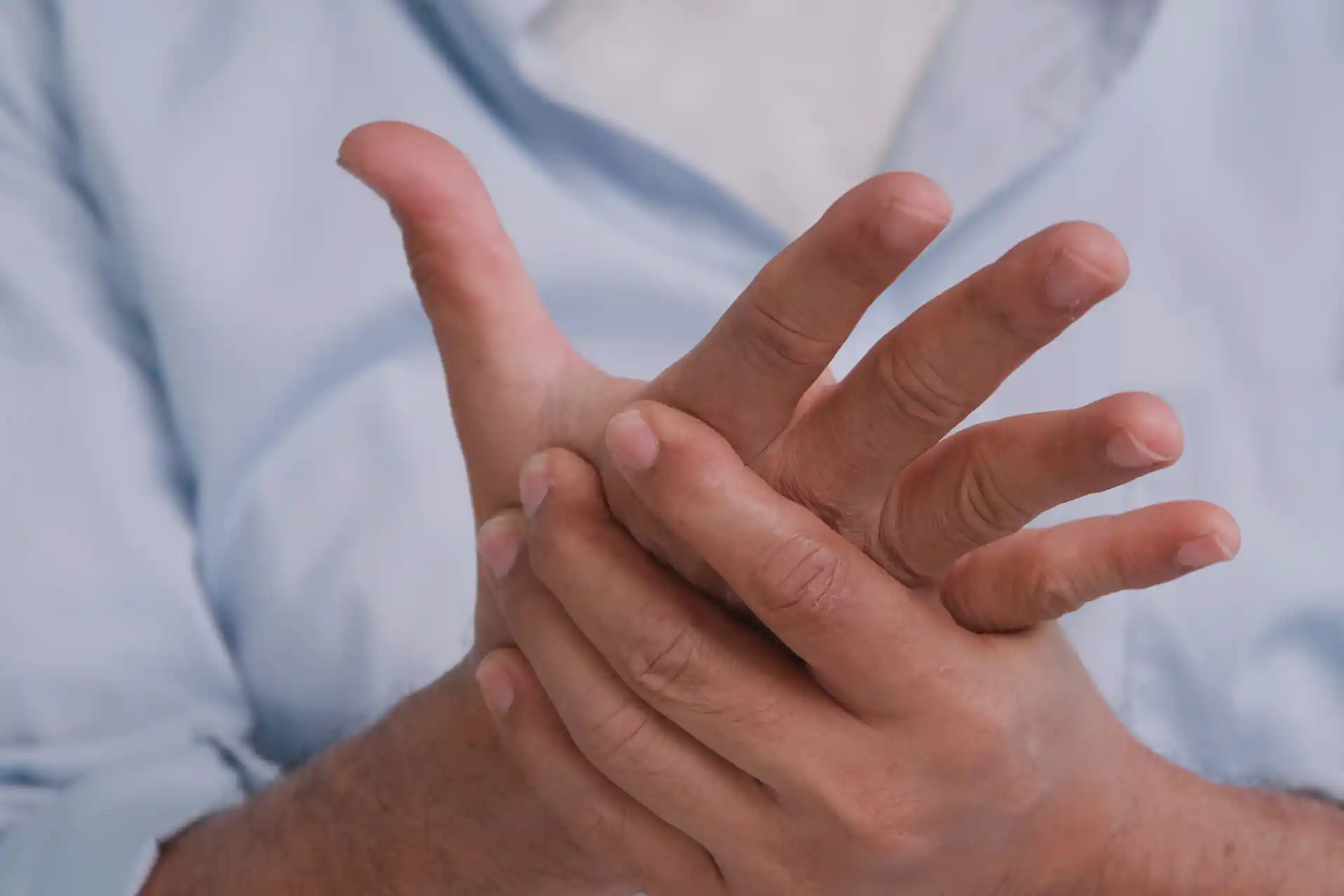Spot The Early Signs
Tingling in your hands and feet can be alarming, especially when it lingers. Many people describe it as a pins-and-needles sensation that makes typing, walking, or even holding small objects more difficult.
Medical News Today estimates that about 2.4% of the population experiences this problem, often linked to peripheral neuropathy. Symptoms often begin in the toes or fingers and progress upward, showing up as prickling, numbness, sudden heat, or small electric-like shocks.
Good news—recognizing these changes early lets you seek help sooner. Many people also notice related issues, such as burning waves, unusual coldness, or fading grip strength. If these problems persist or worsen, a conversation with your healthcare provider is the best way to protect your nerve health and prevent complications.
Explore Common Causes
Tingling builds for a variety of reasons. Sometimes it is caused by a straightforward pinched nerve. Other times, major factors like high blood sugar or long-term alcohol use can set off nerve damage. Understanding the range of possibilities can help you focus on a plan to get relief.
Below is a quick-look table of some common triggers you might investigate:
Revisit Diabetes And Blood Sugar
If you have diabetes or prediabetes, consistently high blood sugar might damage your blood vessels as well as your nerves. Around 50–60% of individuals with diabetes develop some form of diabetic neuropathy, which frequently shows up as tingling in your feet and occasionally in your hands (Medical News Today). Elevated glucose levels reduce oxygen and nutrient delivery to nerves, making them more vulnerable over time.
If you worry that diabetes might be your cause, talk with your doctor. You can also read more about diabetic neuropathy to see how nerve pain develops in people managing diabetes.
Check For Vitamin Deficiencies
Vitamins B1, B6, B12, E, and folate all support healthy nerve function. Low levels can leave nerves short of vital nutrients, which may lead to numbness or tingling sensations.
For instance, a persistent deficiency in vitamin B12 can disrupt nerve signaling and spark uncomfortable pinpricks in your extremities (Healthline). When you fix the deficiency, you often reduce or eliminate those unpleasant nerve symptoms.
Over-supplementation, however, can also be an issue with some vitamins, like vitamin B6. Always check with a healthcare provider before making big changes to your supplement routine. A simple blood test will usually clarify if you are genuinely deficient or over the recommended levels.
Consider Lifestyle Factors
Smoking narrows your blood vessels, limits circulation, and starves your nerves of oxygen. This makes tingling worse if you already have peripheral neuropathy.
Similarly, heavy drinking can produce alcoholic neuropathy. In fact, up to 66% of long-term drinkers develop nerve-related issues in their limbs, especially in the feet (Medical News Today).
If you regularly smoke or drink, cutting back or quitting could ease your symptoms and help you regain control over your nerve wellness.
Understand Other Medical Triggers
While diabetes or nutrition gaps are top triggers, other health conditions can also be behind tingling in hands and feet. Sometimes, the issue is physical, like a trapped nerve. Other times, it might be connected to an immune response, infection, or even pregnancy.
Being mindful of each possibility can save you time and headache when building a plan with your doctor.
Pinched Or Entrapped Nerves
Repetitive injuries, poor posture, or inflammatory conditions often lead to nerve entrapment. A classic example is carpal tunnel syndrome, in which the median nerve at the wrist is compressed. If you notice numbness or tingling in your thumb, index finger, or middle finger, it is worth looking into.
Another common entrapment is a pinched nerve in your lower back, which can cause tingling that travels down your legs or into your feet, sometimes signaling nerve radiculopathy.
If nerve entrapment is suspected, a specialized test such as a nerve conduction study can confirm whether your nerve signals have slowed in certain spots.
Such studies measure how quickly your nerves transmit impulses, helping identify the precise location of the problem. The results are usually combined with a physical exam and personal history to guide treatment.
To learn more about other conditions can be triggered by nerve entrapment, read up on pinched neck nerve, carpal tunnel syndrome, and sciatic nerve pain.
Autoimmune And Infections
Autoimmune disorders like rheumatoid arthritis, lupus, and multiple sclerosis can damage nerve coatings, leading to incorrect or slowed signals.
If you experience persistent tingling alongside joint pain or fatigue, you may want to discuss an autoimmune screening with your medical team (Healthline).
Certain infections such as HIV/AIDS, Lyme disease, hepatitis B or C, and shingles can also inflame or attack nerves, sometimes creating long-lasting numbness.
In these cases, treating the root infection or managing the autoimmune disorder often helps curb tingling. It may take time for nerves to recover, and in some instances, the nerve damage may be irreversible. However, consistent therapy and maintenance can prevent further deterioration.
Pregnancy-Related Pressures
When you are pregnant, the growing uterus may press on nerves in your hips and legs, sometimes creating a pins-and-needles feeling in your feet. Fluid retention, weight gain, and posture changes can also contribute to nerve compression.
These sensations often ease when you shift position or elevate your feet. Gentle exercise and frequent rest breaks may keep blood flowing and reduce nerve swelling.
Try Practical Solutions
Once you determine the cause of tingling in hands and feet, you have multiple strategies to feel better. Lifestyle changes can be surprisingly effective at preserving or improving nerve function. You can also add complementary therapies to your routine, provided you discuss them with a healthcare pro.
Below are a few approaches you may want to consider:
Make Lifestyle Changes
- Quit smoking: Expands blood vessels and restores oxygen flow to nerves.
- Limit alcohol: Protects against further nerve damage and supports vitamin balance.
- Exercise gently: Walking, swimming, or cycling boosts circulation and stabilizes blood sugar.
- Check footwear: Supportive shoes prevent unnecessary pressure points that can worsen nerve irritation.
Evaluate Complementary Therapies
- Warm saltwater soaks: May soothe diabetic nerve pain and relax stiff feet.
- Acupuncture or chiropractic care: Some individuals report reduced tingling, though scientific evidence is mixed.
- Herbal and essential oils: Options like lavender or primrose oil have anti-inflammatory properties, but they should always be diluted and used with caution.
Consider Medical Evaluations
If your tingling persists and at-home solutions are not enough, your doctor may suggest further diagnostic tests:
- Blood tests: Identify deficiencies, thyroid problems, or diabetes markers.
- Nerve studies and imaging: Nerve conduction studies and EMG tests reveal how well nerves and muscles are working; MRIs can uncover herniated discs or spinal compression.
- Specialist care: Neurologists, endocrinologists, or rheumatologists can pinpoint autoimmune, metabolic, or nerve-related causes.
Plan Your Next Steps
- Watch for changes: If tingling spreads, worsens, or disrupts daily tasks, schedule an appointment promptly.
- Protect your feet: Numbness lowers your ability to feel heat, cold, or injury. Inspect your feet daily for cuts or blisters.
- Stay informed: Learn about related conditions like peripheral neuropathy, Guillain-Barré syndrome, or Charcot-Marie-Tooth disease to ask better questions during visits.
- Seek support: Talking with friends, family, or support groups helps reduce stress and can improve coping.
You are not alone in dealing with tingling in hands and feet, this problem is common and often manageable.
With a thoughtful approach—spotting early signs, uncovering the causes, and acting on practical strategies—you can reduce discomfort and protect your nerve health for the long haul.
By aligning your habits and medical care, you put yourself in a stronger position to feel better and focus on the activities you love.
Seek RELIEF®
RELIEF® is a science-backed treatment that targets dysfunctional fascia, which may contribute to nerve irritation and peripheral neuropathy.
Using a gentle technique called hydrodissection, RELIEF® releases adhered fascia and soft tissue that can press on nerves—helping reduce tingling, burning, numbness, and pain associated with nerve pain and other peripheral neuropathy conditions.1-7
RELIEF® is a minimally invasive alternative to traditional treatments and does not require steroids, long-term medication, surgery, anesthesia, or post-procedure immobilization.
If you’re in the Miami area and seeking relief from peripheral neuropathy, contact us today to schedule a consultation.





.webp)
.svg)